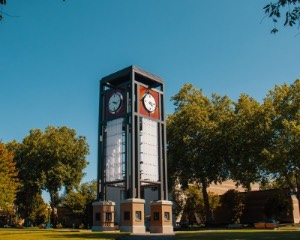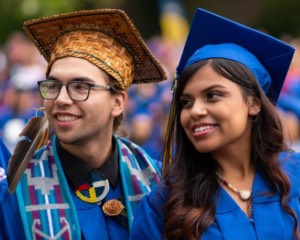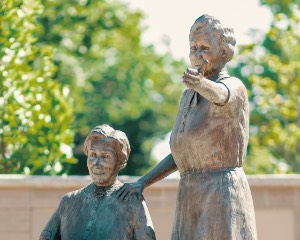Land Acknowledgement
Centralia College wishes to acknowledge its placement on the ancestral homelands of the Chehalis and Cowlitz people.



Land Acknowledgement
We live, work, and learn on the ancestral homelands of the Chehalis and Cowlitz people, whose lands were taken by declaration and occupation, but whose cultural claim as stewards of these lands and waters endures, as it has for countless generations. To ensure we truly honor the gravity of the past, we reflect on the displacement, forced removal, and genocides that took place throughout Washington and beyond. We pay respect to the Chehalis, Cowlitz, and Yakima Elders past and present, and stand in solidarity through their struggles with continued systemic oppression. We commit to care for the lives, land, and water, and prioritize equity through both learning and unlearning.
Short Land Acknowledgement For Speeches
Centralia College encourages community members to use the following short land acknowledgments for public speaking events.
We live, work, and learn on the stolen ancestral homelands of the Chehalis and Cowlitz Tribes. We renew our commitment to strengthen our relationships by prioritizing equity.
We pause to acknowledge that the land we live, work, learn, and commune on is the original and occupied homelands of the Chehalis and Cowlitz people. We commit to strengthening our relationships by prioritizing equity and centering the voices of the Tribes through our actions.
Founded in 1925, Centralia College is the oldest continuously operating community college in Washington State. Centralia itself has been called one of the largest communities in the nation to be founded by an African-American couple. These distinctions are due to the efforts of the Mothers of Centralia College—Katherine Kemp and Margaret Corbet—and the Father of Centralia—George Washington.
We meet today on George Washington’s original land claim, established in 1852. He filed the plat that became Centralia, then called Centerville, in 1875, envisioning a town of connected and interdependent neighbors. The 4-block square plat included the streets, named by his wife, Mary Jane, that basically bound Centralia College today—Plum, Pearl, Pear, Locust, and Walnut to name a few. In 2017, the bicentennial of Washington’s birth, the college rededicated Washington Hall to Centralia founder George Washington and the people of Washington state.
If not for Katharine Kemp and Margaret Corbet, Centralia College would not hold its historic distinction for continuous operation. In 1933, before the college was even 10 years old, the Great Depression had so reduced student enrollment and thus tuition dollars, that closure seemed imminent. Dean Margaret Corbet, and Dean of Women Katharine Kemp asked staff: “what’s the least amount of money you can live on this month?” They also solicited loans from local business owners. Three short years later, the 62 community members’ loans were repaid in full, and the faculty and staff had received all of their back pay.
Problems arose again in 1945, prompting Kemp to remark, “In the ‘30s we had students and no money. In the 40’s we had money and no students.” Kemp and Corbet met with the State Superintendent of Public Instruction who told them: “Whatever you do, keep the doors open!”
Today, a statue of Margaret Corbet and Katharine Kemp stands outside of this building, welcoming all to our campus, and standing as a testament to their perseverance. Cast by Jim Stafford, a local artist and CC grad, this work joined his Reach for the Stars sculpture featured in front of Washington Hall. Bringing this story full circle, Jim also created the statue of George and Mary Jane Washington that stands in Washington Park just a couple short blocks away. I believe the two statues by the same artist encapsulates the community-mindedness and interdependence championed by the Mothers of Centralia College, and the Father of Centralia.
About Heather Beaird
This history was prepared by Heather Beaird, a graduate of both Centralia College and Washington State University-Vancouver. She currently works at Centralia College, where she helps connect students to on- and off-campus employment through a variety of funding programs. Beaird's interest in local history began when she learned Chehalis (then Saundersville) was founded by a woman—Elizabeth Saunders Barrett—and that she lived on one of Barrett's first additions to the original town plat, on a street named for her son. Beaird went to the Lewis County Historical Museum and offered to be a volunteer. Within two months, she was a member of the Board of Directors and was working with the Museum Director to research and write articles for The Chronicle under the headline, Andy Skinner Commentary.
In 2017, Beaird was invited by a Centralia College faculty member to give a short talk on Centralia’s founder, George Washington, for Black History Month. That five-minute talk led to two Lyceum presentations, and a keynote speech at the rededication event for Washington Hall at the college, plus multiple other public events since.
Centralia College adopted this land acknowledgment in solidarity with the Chehalis, Cowlitz, Yakima, and Squaxin Island Tribes. The college’s main campus is in Centralia, Wash. The college also maintains a campus in Morton, Wash. Centralia College has three off-site education centers in correctional facilities in Shelton, Chehalis, and Littlerock, Wash. The land acknowledgement intends to honor the first people of each of these places.
Centralia College continues to engage tribes to understand what actions our community can take to stand in solidarity with them.
Thalia Vaillancourt, Centralia College Director of Equity and Inclusion, initially connected with the Chehalis tribe in winter 2023. It was decided that the college would draft its own land acknowledgment, using Centralia High School’s land acknowledgment as a starting point. The tribe asked that the college get student feedback, and requested the college share its final draft with the tribe for further feedback.
An initial draft of the land acknowledgement was presented to the college’s Justice, Equity, Diversity, and Inclusion committee during spring quarter 2024. The group reworked the draft, which was then presented to the Student Advocacy Activities Leadership Team (SAALT) to gain their support and collaboration. Additional edits were made and it was sent out to the campus community via online survey, tabling at several student and staff events, and through online mediums, including student/staff email and Canvas in spring 2024.
The feedback collected from those efforts was used to create a further draft, which was presented to the Chehalis tribe for review. It was approved in June 2024 and is posted here.
Contact
Joy Anglesey
Vice President of Human Resources & Equity
Title IX Coordinator
Centralia College
600 Centralia College Blvd.
Centralia, WA 98531
360-623-8943
Email Joy Anglesey
